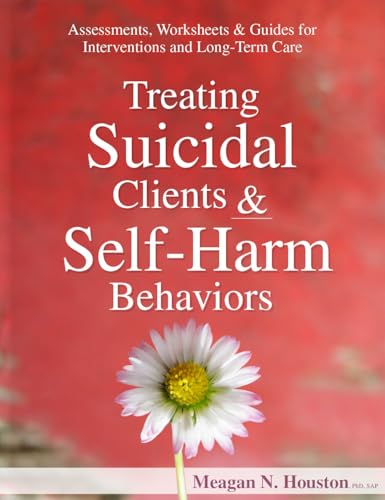Treating Suicidal Clients & Self-Harm Behaviors
Assessments, Worksheets & Guides for Interventions and Long-Term Care
Dr. Meagan N Houston
BOOK REVIEW

In a world increasingly aware of mental health issues, Treating Suicidal Clients & Self-Harm Behaviors: Assessments, Worksheets & Guides for Interventions and Long-Term Care emerges as a beacon of knowledge and compassion. Written by the esteemed Dr. Meagan N Houston, this groundbreaking book dives deep into the churning waters of psychological turmoil, offering not just theoretical insights, but practical tools that can change lives-a lifeline to those who need it most.
Dr. Houston, a figure who stands at the intersection of therapy and empathy, meticulously crafts a roadmap that therapists and mental health practitioners can follow. Her work, a product of years spent in the trenches of therapeutic practice, is not merely a manual; it's a call to action. The 234-page guide is peppered with assessments, worksheets, and techniques that are designed to ignite hope and heal those grappling with suicidal ideations and self-harm tendencies. This is not just a book; it's a passionate plea for human connection, understanding, and proactive intervention in the face of despair.
Why is the subject matter so urgently relevant? The statistics are staggering-over 800,000 people die by suicide each year globally, a heartbreaking number that doesn't account for the countless others who struggle in silence. The stigma surrounding mental illness can feel like a dense fog, preventing people from seeking help. Dr. Houston shatters this silence, inviting readers to not just acknowledge the pain but to address it with actionable strategies. By providing worksheets and assessment tools, she transforms the abstract into the concrete, granting professionals the means to navigate through the murky waters of their clients' distress.
Readers have reacted strongly to Houston's work. Some praise its clarity and practicality, hailing it as a crucial resource in their therapeutic toolkit. Others find that the raw, honest exploration of themes such as self-harm and suicidal thoughts can be uncomfortable but necessary. As one reviewer poignantly noted, "The book might feel like a punch to the gut, but each word provokes essential conversations that need to happen." Such comments underline a critical aspect of healing-discomfort can often precede progress.
Yet, this book does not shy away from potential critique. Some voice concern that the wealth of information might feel overwhelming for new practitioners. However, one could argue that this overwhelming nature stems from the very complexity of human emotions and mental struggles-a testament to the depth of Houston's understanding. It forces us to confront the uncomfortable truths of mental health that are often glossed over in simpler texts.
In exploring the historical context of mental health treatment, it is vital to recognize that the conversation around suicide has evolved. From Freud's early theories to today's evidence-based practices, the way we approach mental health is profoundly influenced by cultural views. Houston's work sits at this critical crossroads, blending historical knowledge with contemporary issues. She equips professionals to deal with the realities of mental health crises in today's world-where social media, isolation, and stigma can exacerbate feelings of hopelessness.
Intriguingly, those who have aligned themselves with Houston's teaching have begun to make waves in the therapeutic community. Influential figures have cited her strategies in workshops and seminars, highlighting how her approach fosters a more responsive and sensitive therapeutic environment. This ripple effect is one of Houston's most significant achievements-her words don't just educate; they inspire a movement towards a more compassionate treatment of mental distress.
Dare to delve into this pivotal work and feel the pulse of countless lives inspired by Dr. Meagan N Houston. In a reality where many suffer in silence, Treating Suicidal Clients & Self-Harm Behaviors holds the key to unlocking understanding and empathy. You owe it to yourself-and to those around you-to explore the depths of this book, for it is an invitation to not only witness the struggles but to engage actively in the healing journey. This is the kind of literature that doesn't just belong on your shelf; it demands to shape your practice and your life. Don't let this opportunity slip through your fingers. 🌟
📖 Treating Suicidal Clients & Self-Harm Behaviors: Assessments, Worksheets & Guides for Interventions and Long-Term Care
✍ by Dr. Meagan N Houston
🧾 234 pages
2017
#treating #suicidal #clients #self #harm #behaviors #assessments #worksheets #guides #interventions #long #term #care #meagan #houston #DrMeaganNHouston